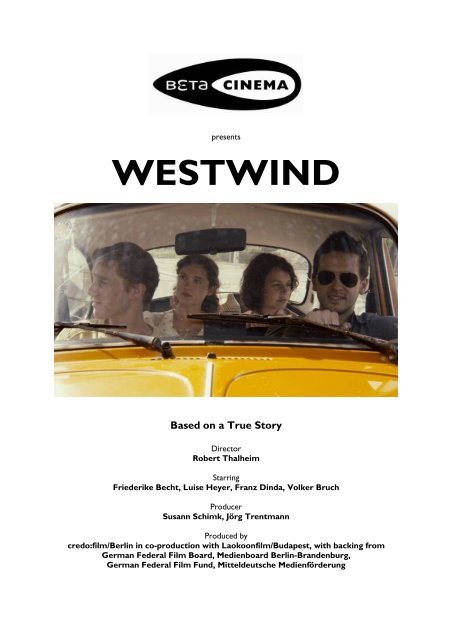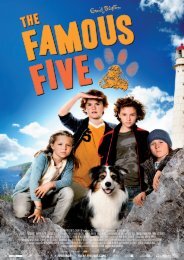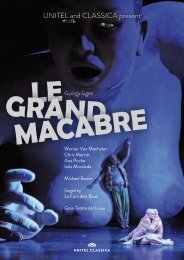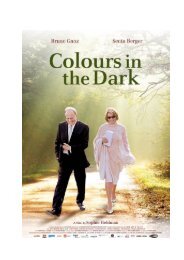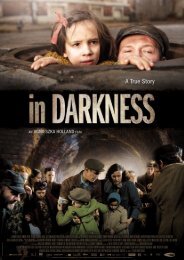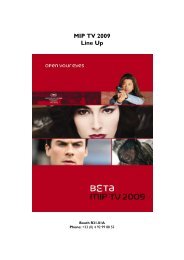You also want an ePaper? Increase the reach of your titles
YUMPU automatically turns print PDFs into web optimized ePapers that Google loves.
presents<br />
WESTWIND<br />
Based on a True Story<br />
Director<br />
Robert Thalheim<br />
Starring<br />
Friederike Becht, Luise Heyer, Franz Dinda, Volker Bruch<br />
Producer<br />
Susann Schimk, Jörg Trentmann<br />
Produced by<br />
credo:film/Berlin in co-production with Laokoonfilm/Budapest, with backing from<br />
German Federal Film Board, Medienboard Berlin-Brandenburg,<br />
German Federal Film Fund, Mitteldeutsche Medienförderung
CAST<br />
Doreen<br />
Isa<br />
Arne<br />
Nico<br />
Balisch<br />
Klaus<br />
Ronny<br />
Friederike Becht<br />
Luise Heyer<br />
Franz Dinda<br />
Volker Bruch<br />
Hans Uwe Bauer<br />
Hannes Wegener<br />
Albrecht Schuch<br />
CREW<br />
Writer<br />
Dramaturgy<br />
Director<br />
Cinematographer<br />
Set Design<br />
Costumes<br />
Make-up<br />
Editors<br />
Sound<br />
Music<br />
Co-Producers<br />
Producers<br />
Ilja Haller, Susann Schimk<br />
Iain Dilthey<br />
Robert Thalheim<br />
Eeva Fleig<br />
Susanne Abel<br />
Nadine Kremeier<br />
Nadine Tschöpe<br />
Stefan Kobe, Christoph Sturm, Oliver Grothoff<br />
Anton Feist, Uwe Bossenz, Detlef Schitto<br />
Christian Conrad<br />
Judit Stalter, Gabor Sipos, Gabor Rajna<br />
Susann Schimk, Jörg Trentmann<br />
TECHNICAL DATA<br />
Running time 90 Min.<br />
Format 35mm, 1:1,85<br />
Sound<br />
Dolby Digital<br />
2<br />
For further information:<br />
Beta Cinema Press, Dorothee Stoewahse, Tel: + 49 89 67 34 69 15, Mobile: + 49 170 63 84 627<br />
press@betafilm.com, www.betacinema.com.<br />
Pictures and filmclips available on ftp.betafilm.com, username: ftppress01, password: 8uV7xG3tB
SHORT SYNOPSIS<br />
Doreen und Isabel are 17-year-old twins from rural Saxony in East Germany. The two are successful<br />
oarswomen practicing hard to be accepted at a renowned boarding school for athletes. In 1988, a<br />
year before the Berlin Wall came down they have the chance to spend the summer at Lake Balaton<br />
in the Soviet satellite state of Hungary. Already on their way to the young pioneer camp, the twins<br />
meet a group of guys from the West German city of Hamburg. Doreen falls in love with Arne. For<br />
the first time the sisters don´t share everything and need to take the most momentous decision of<br />
their lives.<br />
SYNOPSIS<br />
17-year-old twins Doreen and Isabel are future competitive athletes with the rowing club Dynamo in<br />
East Berlin. In 1988, one year before the wall would come down they are travelling abroad for the<br />
first time to the socialist country Hungary. Their coach Balisch, who manages a German-Hungarian<br />
Young Pioneer camp right on Lake Balaton, has invited them to Siofok as a reward for winning the<br />
county championships. This was to turn into the most important summer of their lives.<br />
Full of anticipation, the girls are on the train, testing each other on Hungarian vocabulary, and<br />
cheering their first glimpse on the lake, the beach and the endless horizon. In the train station they<br />
miss their bus to the camp due to a quick trip to a record store and hence start walking. Two West<br />
Germans, of all people, Arne and Nico from Hamburg, offer the two a lift in their bright orange<br />
Volkswagen beetle. After a moment's hesitation, the girls get in. It quickly becomes obvious that they<br />
get along very well and like the same music – which the twins, as they remark ironically, can only<br />
receive on their radio at home if the wind is westerly. When the Beetle pulls up in front of the<br />
pioneer camp the security guard at the gate eyes them suspiciously over the fence. Arne's suggestion<br />
to do something together soon is vehemently blocked by Isabel.<br />
In the camp the sisters enjoy special privileges among the pioneers, like their own tent and<br />
independent training hours. The girls spend their first evening at a campfire on the beach together<br />
with camp counselors Ronny and Klaus, enjoying the summer feeling. The following day, sisters and<br />
counselors join the children for a game of volleyball. When suddenly the boys from Hamburg turn up<br />
next to the playing field with two more friends, the jolly summer mood becomes complicated, but<br />
exciting as well: Ronny's gruff question how they managed to come in is countered by the intruders,<br />
cheekily and casually with „Why, there was no fence we couldn't have climbed“. During the short<br />
match together the friction between the two camps comes to the fore. When Balisch surprises the<br />
unbidden guests on the premises, he is dumbfounded: That the girls would jeopardize their whole<br />
future so blithely is beyond his understanding. He bans any contact with the West Germans and<br />
demands the twins get his permission before they leave the camp.<br />
But Arne and Nico won't give up that easily and they invite the sisters to the disco. In the evening<br />
the girls put on make-up, style their hair with the aid of pineapple juice und furtively climb the fence<br />
For further information:<br />
Beta Cinema Press, Dorothee Stoewahse, Tel: + 49 89 67 34 69 15, Mobile: + 49 170 63 84 627<br />
press@betafilm.com, www.betacinema.com.<br />
Pictures and filmclips available on ftp.betafilm.com, username: ftppress01, password: 8uV7xG3tB<br />
3
to get out. During their dancing, talking, drinking and the subsequent nocturnal visit to the beach,<br />
sparks are increasingly starting to fly between Doreen and Arne. When the girls finally nip back into<br />
the camp, it is already bright daylight.<br />
On the following day the twins leave for the forest with a group of kids to gather wood for building<br />
the traditional raft. They notice the orange beetle in front of the camp, but try to act<br />
inconspicuously. Arne intercepts Doreen in the forest when the children are already making their<br />
way back. The previous night's magic returns immediately. The two are facing each other among the<br />
trees, their looks speaking volumes. Doreen returns to the camp too late and is unable to hide her<br />
infatuated grin.<br />
The next day, Doreen gets Balisch's permission to buy a present for her mother in Siofok. Isa is<br />
surprised when it's made clear that instead they will meet with the guys from Hamburg at the public<br />
beach. The twins drink Coca-Cola for the first time in their lives and are persuaded to go on a<br />
double date: While Isa and Nico, in the empty hotel restaurant, are groping embarrassedly for<br />
common topics Arne and Doreen are driving wildly along Lake Balaton to the accompaniment of<br />
loud western music. The two are getting increasingly closer they are head over heels in love. The<br />
thought that in a few days they will have to part forever is so painful to them, that at their farewell<br />
Arne suggests to Doreen to take her into the west with him. Isa has to cover for Doreen with<br />
Balisch once again. When Doreen finally arrives back in camp, Isa upbraids her severely. She has<br />
noticed that Doreen is changing.<br />
While Doreen is overwhelmed by those new, exciting emotions, this development feels like a painful<br />
loss to Isa, who misses being close to her sister. The following day, Arne tells Doreen of his plans for<br />
escape: His friends would help him smuggle the girls into the West in the space underneath the<br />
beetle's rear shelf. Doreen can barely react, for she is completely torn. She longs to see the world,<br />
to be free and is feeling adventurous. At the same time, she has no wish to destroy her and Isa's<br />
common future as professional athletes. During the rowing exercises Doreen is unable to<br />
concentrate, the twins are not beating the same rhythm any more. A little later, when Doreen spills<br />
all and tells Isa that she has fallen in love with Arne, Isa tries to comfort her. But Doreen cannot help<br />
feeling that Arne is the one big love of her life. Together the sisters decide that Doreen will have to<br />
forget Arne.<br />
The heartbroken Doreen can't find any peace at night. She wants to at least say goodbye to Arne and<br />
sneaks from the camp for one last time. Isa has a bad feeling when Doreen leaves her behind alone in<br />
the tent. Underneath Doreen's pillow she finds a Walkman with a cassette that Arne had recorded<br />
for Doreen. On that tape, Arne speaks of a common future in Hamburg. Isa is dumbfounded. She<br />
thinks Doreen wants to flee to the West with Arne this very night. All through the night, she paces<br />
the camp and keeps listening to the tape. The next morning, Isa is sitting at breakfast, completely<br />
listless and unresponsive, still wearing the headphones. Balisch confiscates the Walkman in the very<br />
instant Doreen rushes into the breakfast room. Isa realizes she has made a fatal error. Their future<br />
on the rowing cadre seems to be over. Do the sisters have anything left to lose The boys' departure<br />
is drawing closer and closer, and the twins must make the most fateful decision of their lives.<br />
For further information:<br />
Beta Cinema Press, Dorothee Stoewahse, Tel: + 49 89 67 34 69 15, Mobile: + 49 170 63 84 627<br />
press@betafilm.com, www.betacinema.com.<br />
Pictures and filmclips available on ftp.betafilm.com, username: ftppress01, password: 8uV7xG3tB<br />
4
DIRECTOR'S STATEMENT by ROBERT THALHEIM<br />
WESTWIND tells foremost a quite universal story, albeit in front of a specific historical background:<br />
A relationship between two persons is put to the test by meeting a third. For at the start of this<br />
summer of 1988 in Hungary twin sisters Isabel and Doreen are contented, happy even, in their<br />
familiar world, characterized by their profound proximity. Only through the encounter with the<br />
West German Arne they slowly begin to feel the boundaries that their lives move in.<br />
Doreen's budding love, her yearning for a future together with Arne, turns into a danger for the<br />
sisters' symbiotic relationship. Imperceptibly at first, then increasingly, the political circumstances<br />
influence the twins' relationship. The dilemma of their times rises irrefutably: A common future for<br />
Doreen and Arne is incompatible with the sisters' dream of a career as rowers in the GDR. Isa and<br />
Doreen are torn between proximity and distance, between individuality and togetherness, between<br />
here and there. Their struggle for a common path, that looks so futile in view of the background of<br />
world politics, is the touching core of this story. With each step these two head for a decision that is<br />
really to large for them. A decision which will produce irreversible, very real consequences for their<br />
further lives. Isabel and Doreen have to realize that their only chance not to grow apart at heart lies<br />
in physical separation. From their point of view, in the summer of 1988, this would have meant a<br />
separation for ever.<br />
My concern was to tell about the clash of the two German spheres as unpretentiously as possible.<br />
That means leaving space for the existential drama that slowly arises from the encounter with<br />
strangers and still not losing sight of the historical context in front of which this story plays itself out.<br />
In reflecting the history of the two German states we are, in my opinion still at the very beginning of<br />
taking a closer look, which has to – beyond great dramas of escape and repression – educate itself<br />
with this kind of stories.<br />
The story at hand is pretty much the exact story of Susann and Doreen Schimk from the year 1988.<br />
There was Lake Balaton, the exciting guy Arne from Hamburg, the holiday camp, the green<br />
swimsuits, the pineapple juice as hair gel and the escape in the Volkswagen beetle underneath the<br />
rear shelf. The twins are not identical, don't really resemble each other and have the same way of<br />
laughing. But still, they were always perceived as a double. By parents, teachers, siblings and friends,<br />
the twins, up to their 17th year, were always regarded as one person.<br />
The holiday on the Balaton changed and influenced the twins' lives in the extreme. The events in<br />
Hungary are to this day emotionally highly charged and eventually the reason for their being together<br />
in Hamburg in the 90s, where their mother still resides today. Doreen later was out and about in<br />
New York as DJ Queen Doreen. She was, and still is, a gifted dancer and a total music fanatic. Susann<br />
has been living in Berlin since the mid-90s, studied film production and since 2001 is managing<br />
director of credo:film GmbH.<br />
Jörg Trentmann, Susann's business partner, knows the twins very well and decided to film their story.<br />
Three years ago, the first interviews were given to author Ilja Haller. The final script versions were<br />
written by Susann Schimk herself, in collaboration with Iain Dilthey. Filming took place on location in<br />
Hungary, also in the original camp of the Young Pioneers on Lake Balaton. The credo:film was<br />
supported by Hungarian co-producer Laokoonfilm Budapest.<br />
For further information:<br />
Beta Cinema Press, Dorothee Stoewahse, Tel: + 49 89 67 34 69 15, Mobile: + 49 170 63 84 627<br />
press@betafilm.com, www.betacinema.com.<br />
Pictures and filmclips available on ftp.betafilm.com, username: ftppress01, password: 8uV7xG3tB<br />
5
INTERVIEW with SUSANN SCHIMK<br />
Was it your personal desire to tell your and your twin sister's story, or was it suggested to you by someone<br />
else<br />
This idea is clearly my partner Jörg Trentmann's responsibility. It goes back to a wonderful Sunday<br />
afternoon in Berlin in the summer of 2007. My sister and I told our story to Jörg and to Ilja Haller, an<br />
author friend of his. Ilja later remembered, that the two of us had really been crying that whole time.<br />
Jörg decided to develop a script from our story, and we gave several interviews to Ilja. Early in 2008<br />
a first draft existed, which we all liked very much. Then it took another two years until filming began.<br />
But several interviews existed much earlier than that, didn't they<br />
Doreen had always turned down requests from the press in Hamburg, from the Spiegel magazine etc.<br />
Only for the 10-year anniversary of the fall of the Berlin Wall, she gave a one hour radio interview.<br />
And how did things turn out for you and your family after the successful escape<br />
That is the big question that is left pending in the film. Perhaps we should relate that in a sequel. I<br />
went back, and during the 13-hour train ride was trembling whether Doreen had made it; that was<br />
dramaturgically abbreviated in the film.<br />
In real life, my sister had phoned our mother from Vienna. I was just returning home with my<br />
backpack when our completely stunned mother came around the corner in her Trabant car. So I<br />
heard from my mother that Doreen had made it. I almost collapsed from the tension and reacted<br />
quite hysterically. A few minutes later, the Staatssicherheit (secret police) turned up at our door, to<br />
question me.<br />
But wasn't there always a backlash for the families of „fugitives from the republic“<br />
My family and I were repeatedly questioned by the Staatssicherheit, but it wasn't like we were in any<br />
way socially ostracized. We now had a file and were under supervision. The greater challenge was to<br />
handle the questions from friends and acquaintances, why I hadn't also gone to the West. For myself,<br />
I then had to cope alone without my twin and bear the loss, and the uncertainty about Doreen's<br />
future.<br />
And subsequently, was there actually a year's radio silence between you and your sister<br />
There were a few letters, which were naturally censored. From time to time we managed to speak<br />
on the phone. One year later we arranged in code to meet in Prague, but she didn't come. Instead<br />
Nico turned up with a letter from my sister. It was the night when Foreign Secretary Genscher<br />
announced from the balcony of the West German embassy that the fugitives there would be allowed<br />
to leave the country. Doreen wrote that she didn't dare to come to Czechoslovakia, and if we<br />
wanted to meet again, I should attempt it via the embassy. Nico then accompanied me with his<br />
(West German) passport, past all barriers to the embassy gate. The gate was closed and I made a<br />
wager with him: Should the door open, I would get in, if not, then so be it. The gate opened and I<br />
walked into the embassy of the Federal Republic, which the night before the masses of fugitives had<br />
left in a mad rush. There was total chaos, with ever more East Germans arriving.<br />
6<br />
For further information:<br />
Beta Cinema Press, Dorothee Stoewahse, Tel: + 49 89 67 34 69 15, Mobile: + 49 170 63 84 627<br />
press@betafilm.com, www.betacinema.com.<br />
Pictures and filmclips available on ftp.betafilm.com, username: ftppress01, password: 8uV7xG3tB
Wasn't it frequently like this, in times of the GDR, that these great love stories, that often seemed to<br />
end rather abruptly, in a certain way were used as an excuse to act out subconscious desires of<br />
escape<br />
In Doreen's case, clearly not, she was utterly enchanted by this man who appeared to her like a<br />
wonder of the world. Dorle had always been an adventuress, filled with energy and curiosity.<br />
Then, at 17, the word was simply „now or never“! All people we talked to always asked us quite<br />
aghast how we could do that, leave our parents and our home. It was never about being able to eat<br />
Nutella. Dorle is simply a flashy butterfly. This decision was not one against the GDR, but one in<br />
favor of the big, wide world.<br />
As co-author and producer you are a driving force behind this film version. To which degree was your sister<br />
involved in the process<br />
During development I soon realized how strong it would be to rely on true events. Thus, Doreen's<br />
influence is palpable especially in the script, frequently with original dialogue. During preproduction I<br />
had a baby, and Dorle went location hunting in Hungary for me. After 22 years she was back in<br />
Siofok for the first time, in our pioneer camp from those days, where we eventually made the film.<br />
She was extremely excited, the memories did quite upset her.<br />
Today we know that at the time the GDR was already on its last legs, so was there already an optimistic<br />
atmosphere<br />
No one dreamed one year before the wall came down that such a thing would ever happen. At that<br />
time, the Iron Curtain was clearly a reality. In 1988 in Hungary for instance, there were some 400<br />
attempts by East Germans to cross the border, only 40 of which actually succeeded. The events in<br />
the east European embassies of the GFR also didn't happen until one year later.<br />
INTERVIEW with DOREEN SCHIMK<br />
How did you feel, watching this film that tells your private story<br />
I was extremely moved: Naturally it's only a movie, but basically still my own story. Even during the<br />
interview that I gave ten years after my flight, I was sitting in this radio studio, weeping for two hours<br />
and realized that a lot of things had still not been processed.<br />
And how did you feel when after 20 years you returned to this place on Lake Balaton, which for you meant<br />
the turn of an era<br />
That was awfully exciting, at first I didn't even realize its momentousness; after all, this Young Pioneer<br />
camp is still there, unchanged. I walked through the camp, my mouth gaping: A proper time travel<br />
into the past.<br />
For further information:<br />
Beta Cinema Press, Dorothee Stoewahse, Tel: + 49 89 67 34 69 15, Mobile: + 49 170 63 84 627<br />
press@betafilm.com, www.betacinema.com.<br />
Pictures and filmclips available on ftp.betafilm.com, username: ftppress01, password: 8uV7xG3tB<br />
7
What did you do after you had arrived in Hamburg<br />
That was my moon landing. For me, a new era had begun, in a new world, with a new culture in a<br />
new country, with new friends, in a completely different life. I came to this small Hamburg suburb,<br />
where word got around quickly that there was this student from the GDR, who had been smuggled<br />
in by boys from Hamburg. To their families, I'm grateful to this day. It was quite sensational then,<br />
there was a welcoming ceremony; underneath the table, bags full of clothing were waiting for me. I<br />
made quite a stir when I ordered a cherry-banana drink in a bar and asked for a „drinking tube“<br />
instead of a straw and the waitress had no idea what I meant. At that point I realized I would have to<br />
learn a whole new language.<br />
Both of you were swept along by that new situation: Was there ever a moment where you regretted taking<br />
this step<br />
No, never.<br />
Would you say that the love story was for you, as it was for many others citizens of the GDR, in a manner of<br />
speaking just a pretext to live your desires for escape<br />
Decidedly not! When at 16 I began an apprenticeship, at the bookseller's in Dresden where I<br />
worked, I noticed many West Germans who spent their compulsory exchange money for books.<br />
These thirty- or forty-somethings seemed so different from what I was used to from the East, they<br />
were still active and mobile at thirty and forty, you simply didn't get the feeling as with the East<br />
Germans, that at this age everything is planned ahead, with job, marriage and kids. This was an<br />
immense contrast to my world. To the question why I fled, my answer has always been: Becaus at<br />
forty I want to be dancing in the disco, wearing a golden turban! For it was very clear to me very<br />
early on that I wanted to go outside, into the great, big world.<br />
FILMOGRAPHY<br />
ROBERT THALHEIM - director<br />
Robert Thalheim was born in 1974 in West Berlin. After his High School graduation in Rockville,<br />
Indiana, and the German university-entrance diploma he worked in alternative national service as a<br />
conscientious objector at the International Youth Centre in Auschwitz (Poland). In the years 1997 to<br />
1998 he was an assistant director at the Berliner Ensemble and besides was studying at the Freie<br />
Universität Berlin, as well as a directing course at the Hochschule für Film und Fernsehen „Konrad<br />
Wolf“ in Potsdam Babelsberg. As Rosa von Praunheim's student he made the short THREE<br />
PERCENT as well as ZEIT IST LEBEN (2001), GRANICA (2002), and ICH (2003).<br />
The following year, Thalheim made his cinematic debut with the feature film NETTO (2004), which<br />
was awarded the Max-Ophüls Förderpreis, the Preis der Deutschen Filmkritik and the Filmkunstpreis<br />
of the Festival of German Film in Ludwigshafen.<br />
In 2006 Thalheim's second feature followed: AND ALONG COME TOURISTS, which, based on his<br />
own experiences, tells the story of a young man doing his alternative national service in Auschwitz.<br />
This film, produced by Hans Christian Schmid's company 23/5 had its premiere at the 2007 Cannes<br />
8<br />
For further information:<br />
Beta Cinema Press, Dorothee Stoewahse, Tel: + 49 89 67 34 69 15, Mobile: + 49 170 63 84 627<br />
press@betafilm.com, www.betacinema.com.<br />
Pictures and filmclips available on ftp.betafilm.com, username: ftppress01, password: 8uV7xG3tB
Festival, in the section “Un certain regard”. It was nominated as Best Film for the German Film<br />
Award and was awarded the Bavarian Film Award for Young Producers, among others. In 2010<br />
Robert Thalheim filmed WESTWIND.<br />
FRIEDERIKE BECHT - Doreen<br />
Friederike Becht was born in 1986 in Bad-Bergzabern. After her training as an actor at the Berliner<br />
Universität der Künste she worked at first as a freelance actress at the Berliner Ensemble, Theater<br />
Freiburg, the Ernst-Deutsch Theater Hamburg and the Schauspielhaus Zürich, among others. After<br />
that followed steady engagements at the Schauspiel Essen and the Schauspielhaus Bochum. In Robert<br />
Thalheim's latest film WESTWIND she can be seen in her first leading part in a feature film.<br />
Filmography (Selection)<br />
2007 THE READER, director Stephen Daldry<br />
2008 MEIN LEBEN, director Dror Zahavi<br />
2010 Soko Wismar – Auf Messers Schneide, director Hans-Christoph Blumenberg<br />
2011 WESTWIND, director Robert Thalheim<br />
LUISE HEYER - Isabel<br />
Luise Heyer was born in 1985 and grew up in Berlin. She first appeared on stage when she was only<br />
16, in the musical “Linie 1”. While studying drama at the Hochschule für Musik und Theater in<br />
Rostock she already worked at the Volkstheater Rostock and since the 2010/2011 season has been a<br />
steady ensemble member at the Schauspiel Dortmund. After appearing in several shorts, the leading<br />
part in Robert Thalheim's WESTWIND marks her cinematic debut.<br />
FRANZ DINDA - Arne<br />
Franz Dinda was born in Jena in 1983. Shortly before the Wall came down he fled to the Federal<br />
Republic of Germany together with his mother, a pastor.<br />
In 2004 he first impressed wider audiences in the Max Ophüls Award-winning featrure film AM TAG<br />
ALS BOBBY EWING STARB. For his impressive performance in the TV-event “Blackout – Die<br />
Erinnerung ist tödlich” in 2007 Dinda was awarded the German Film Award, shortly before that in<br />
2006 he achieved the Bunte New Faces Award for his appearance in Gregor Schnitzler's THE<br />
CLOUD.<br />
In the feature TEENAGE ANGST he not only took on one of the leading parts, but acted as coproducer<br />
as well. Beyond that, in September 2010 he gave his debut as a writer with the poetry<br />
collection „Ein Bilderreimbuch über Liebe”.<br />
For further information:<br />
Beta Cinema Press, Dorothee Stoewahse, Tel: + 49 89 67 34 69 15, Mobile: + 49 170 63 84 627<br />
press@betafilm.com, www.betacinema.com.<br />
Pictures and filmclips available on ftp.betafilm.com, username: ftppress01, password: 8uV7xG3tB<br />
9
Filmography (Selection)<br />
2004 AM TAG ALS BOBBY EWING STARB, director Lars Jessen<br />
2005 Speer & Hitler: The Devil's Architect, director Heinrich Breloer<br />
2006 THE CLOUD, director Gregor Schnitzler<br />
2007 MILITARY ACADEMY, director Granz Henman<br />
2008 TEENAGE ANGST, director Thomas Stuber<br />
2008 A YEAR AGO IN WINTER, director Caroline Link<br />
2008 Mogadishu, director Roland Suso Richter<br />
2009 BERLIN 36, director Kaspar Heidelbach<br />
2010 Schurkenstück, director Torsten C. Fischer<br />
2011 Fugitives, director Andreas Linke<br />
2011 WESTWIND, director Robert Thalheim<br />
VOLKER BRUCH - Nico<br />
Volker Bruch was born in 1980, in Munich. After completing the German university-entrance<br />
diploma, he studied at the Max Reinhardt Seminar in Vienna. First he appeared in several TVproductions<br />
like “Rose” (2005) by Alain Gsponer, before moving to feature films in LIFE ACTUALLY<br />
(2007), THE RED BARON (2008) and BEST TIMES (2006) by Marcus H. Rosenmüller. For his effort<br />
in LIFE ACTUALLY he was nominated in 2007 for the Adolf Grimme Award and the German TV<br />
Award. In 2008 he attracted attention internationally with parts in Stephen Daldry's THE READER<br />
and as Stefan Aust in the RAF-drama THE BAADER MEINHOF COMPLEX, and had parts in THE<br />
MURDER FARM (2009), NANGA PARBAT (2010) and GOETHE! (2010).<br />
Filmography (Selection)<br />
2006 BEST TIMES, director Marcus H. Rosenmüller<br />
2007 LIFE ACTUALLY, director Alain Gsponer<br />
2008 THE BAADER MEINHOF COMPLEX, director Uli Edel<br />
THE READER, director Stephen Daldry<br />
THE RED BARON, director Niki Müllerschön<br />
2009 THE MURDER FARM, director Bettina Oberli<br />
2010 NANGA PARBAT, director Joseph Vilsmaier<br />
GOETHE!, director Philipp Stölzl<br />
2011 WESTWIND, director Robert Thalheim<br />
credo:film - Producer<br />
Berlin film production company credo:film GmbH was founded in 2001 by Susann Schimk and Jörg<br />
Trentmann. Since then, individual features and documentaries for cinema and television are being<br />
developed. After the hitherto successful productions, we want to increasingly create a handshake<br />
between arthouse and mainstream. We are pledged to the cineast narrative mandate. It is essential<br />
for us to gather the authors' craft beyond national boundaries, to unite dramaturgical abilities and<br />
10<br />
For further information:<br />
Beta Cinema Press, Dorothee Stoewahse, Tel: + 49 89 67 34 69 15, Mobile: + 49 170 63 84 627<br />
press@betafilm.com, www.betacinema.com.<br />
Pictures and filmclips available on ftp.betafilm.com, username: ftppress01, password: 8uV7xG3tB
professionalism within the productive process. The managing directors are both members of the<br />
European Film Academy and the German Film Academy. In 2005 credo:verleih Gbr was established<br />
in order to use new ways of distribution more effectively. credo:films are made for eternity!<br />
Filmography (Selection)<br />
2003 7 BRÜDER, documentary, director Sebastian Winkels<br />
WE, director Martin Gypkens<br />
2005 KOMBAT SECHSZEHN, director Mirko Borscht<br />
ABOUT A GIRL, director Catharina Deus<br />
2006 VALERIE, director Birgit Möller<br />
2007 HOUNDS, director Ann-Kristin Reyels<br />
NOTHING ELSE MATTERS, director Julia von Heinz<br />
2008 TORPEDO, director Helene Hegemann<br />
2011 UNTER KONTROLLE, documentary, director Volker Sattel<br />
Awards (Selection)<br />
2003 DEFA-Award for the support of young professionals for 7 BRÜDER<br />
Max-Ophüls-Award for WE<br />
2005 Don-Quichote-Award / Berlinale for THE IRRATIONAL REMAINS<br />
2007 FIPRESCI-Award / Berlinale für HOUNDS<br />
2008 Adolf Grimme Award, ABOUT A GIRL<br />
Best Feature Film International Film Festival Shanghai for ACCORDING TO THE PLAN<br />
2009 Max-Ophüls-Award for TORPEDO<br />
German Film Award Family Entertainment for NOTHING ELSE MATTERS<br />
BETA CINEMA (World Sales)<br />
Beta Cinema, the theatrical division of Beta Film has established itself as a "boutique-operation" for<br />
independent feature films with strong theatrical potential. Beta Cinema's philosophy is to keep its<br />
selective acquisition policy of 10 to 15 titles per year in order to fully develop the theatrical potential<br />
of each title according to its individual character.<br />
Beta Cinema’s portfolio includes outstanding productions like "Viva Riva", which won 6 African<br />
Academy Awards 2011; "Black Bread", big winner at the Spanish Goya Awards 2011; German Film<br />
Award Winners "Vincent Wants to Sea" (2011), "Almanya" (2011) and "John Rabe" (2009); Berlin<br />
2011 out of competition entry "My Best Enemy"; Cannes 2008 Jury Prize-winning "Il Divo"; Academy<br />
Award 2008-winning "The Counterfeiters"; Academy Award 2008 nominated "Mongol"; Academy<br />
Award 2007-winning "The Lives of Others"; and the Academy Award 2005-nominated "Downfall".<br />
CONTACT WORLD SALES<br />
Beta Cinema, Dirk Schuerhoff/Andreas Rothbauer<br />
Tel: + 49 89 67 34 69 80, Fax: + 49 89 67 34 69 888<br />
beta@betacinema.com<br />
For further information:<br />
Beta Cinema Press, Dorothee Stoewahse, Tel: + 49 89 67 34 69 15, Mobile: + 49 170 63 84 627<br />
press@betafilm.com, www.betacinema.com.<br />
Pictures and filmclips available on ftp.betafilm.com, username: ftppress01, password: 8uV7xG3tB<br />
11


